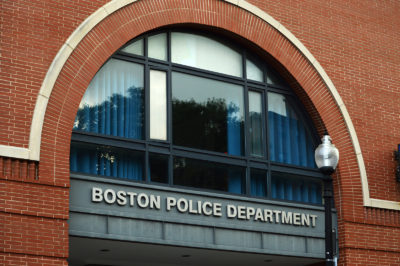
Amid increasing instances of hate crimes in Massachusetts, Gov. Charlie Baker recently reinstated a hate crimes task force, appointing Boston University Police Department Chief Kelly Nee to the unit.
The logistics of the task force are still a work in progress, but when finalized, Nee said, it will meet at least four times a year, handling tasks within and outside formal meetings. Nee said she hopes she can represent colleges and universities’ interests as they attempt to curb hate crimes throughout Massachusetts.
“I am incredibly honored to be considered for this task force,” Nee wrote in an email. “I’m proud of the work I have done with very diverse communities and this allows me the opportunity to make sure the university’s voice is part of the discussion.”
Nee said she strongly supports the decision by Baker and Lt. Gov. Karyn Polito to reinstate the task force and send a strong message against hateful violence, as the task force will help protect the rights of individuals.
“This task force can explore ways to accomplish this safely,” Nee wrote, “and help formulate ways to improve prevention, investigation and prosecution of hate crimes.”
Given the current political climate, Nee said, it’s important to take concrete steps towards protecting people’s rights.
“The rise in hate crimes is concerning and you can see divisiveness all across the [country] just by turning on the news,” Nee wrote. “This is important now because Massachusetts proudly has led the way for issues of tolerance and inclusiveness. We can’t go backward in protecting people’s rights. We have to take a stand that intolerance is unacceptable.”
Nee’s extensive experience in the field of law enforcement, combined with her dedication to stopping crime, made her particularly qualified to be sworn into the task force, according to BU spokesperson Colin Riley.
“It reflects on her law enforcement expertise, her concern and interest in this serious issue,” Riley said, “and we’re very pleased that she has been appointed essentially to invigorate a reestablished task force.”
Robert Molloy, the deputy chief of BUPD, said Nee’s extensive background in commanding positions has prepared her well for her new role.
Nee has over 30 years of law enforcement experience, having served on a task force on human trafficking for the attorney general, and on the U.S. Attorney’s Violent Extremism Prevention group, amongst other notable roles, Molloy said.
Molloy also said he thinks the re-establishment of the task force is necessary in order to address pressing issues within the Massachusetts community.
“When we see the things that are unfolding in our communities today with the divisiveness in communities across the country [and] crime being committed against individuals that is motivated by hate,” Molloy wrote in an email, “having a task force that can develop ways to address these issues and to support victims of hate crimes is very important.”
Several students had mixed opinions regarding the task force’s need in the local community.
Peyton Tierney, a College of Engineering freshman, said she thinks hate crimes are a rising problem that need to be addressed.
“I think definitely hate crime has been more prevalent in recent years,” Tierney said, “so it’s a good thing that task force has been reinstated.”
Yi Yang, a first-year graduate student in the College of Fine Arts, said he does not think hate crimes in the area are a major problem, particularly on campus, where he said students from all walks of life are accepted.
“I haven’t seen any example that there has been an increase or that there’s a significant problem in Boston,” Yang said, “so I’m not sure if we need [the task force].”
Natalie Rosales, a freshman in ENG, said that while she does not think hate crimes have become a big problem yet, it’s good that Boston is taking steps to stop them.
“It’s not something really big that brought it on,” Rosales said. “We’re not doing damage control — we’re trying to prevent. I guess I see it more as a preventative step.”



















































































































